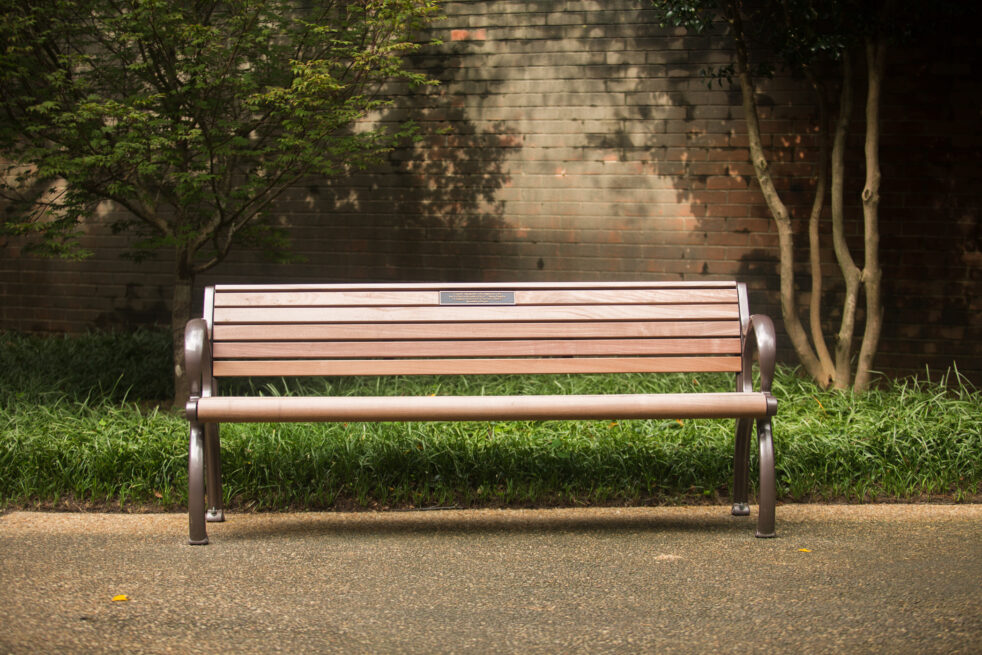This fall, one of Tech’s many greenspaces has been transformed with a special purpose.
The Joint Sexual Violence Advisory Committee (JSVAC) has created a dedicated support space for survivors of sexual violence in the Mayer Memorial Garden, located next to the Skiles Classroom Building. This space features a Japanese bloodgood maple, a symbol for peace and tranquility, as well as a commemorative bench.
“We were kind of looking at it as a space … that says ‘the Georgia Tech community supports those who have experienced sexual violence,’” said third-year AE and JSVAC chair Jodi Camino.
The idea for a support space has been in the works since last year and has now been made possible with funding from the Mental Health Joint Allocation Committee (JAC).
Securing this funding was the first step to implementing the space.
“It cost us a pretty decent chunk of money to secure this because it’s not just the cost of the tree and the bench, but also the cost of the space and maintaining and upkeeping this space,” said Camino. “So we as individuals don’t have to go and maintain that space. That’s something that campus does.”
Next, JSVAC worked with Tech to select the location and finalize details, such as selecting a tree that fit both the climate and the purpose of the space.
“They really helped a lot with working with how exactly that was going to look, where it was going to go, and so we mostly had to kind of deal with the proposal and getting it approved, and then the logistics, Tech was really, really helpful with that,” said Camino.
In the future, the space could possibly be a spot for future events.
“The hope is that we can also … potentially once the pandemic has settled down a little bit, use that space as an active place to hold programming, to hold events, to be a supportive, peaceful environment where those who’ve experienced sexual violence and those who want to kind of collaborate with this goal of supporting survivors and stopping sexual violence can work to do that,” said Camino.
Some ideas for possible events include healing or therapeutic yoga and educational events with the VOICE Peer Educators.
“People can kind of use this space as a place to come and sit and talk to others who share a concern for this area, who might share experiences or might just share a passion,” said Camino.
Next spring, Camino wants to incorporate the tree into the annual Take Back the Night event, a candlelight vigil dedicated to survivors of sexual violence, and hopes the tree can be used to display messages of hope to survivors.
The space also features a bench with a dedication.
“It has a Maya Angelou quote,” said Camino. “So it says, ‘I can be changed by what happens to me. But I refuse to be reduced by it,’ and then it says, ‘In support of survivors of sexual violence, we stand with you.’”
Besides the support space, JSVAC works on campus as the voice for students in matters related to sexual and domestic violence.
“We also aim to work directly with students to promote a campus culture that kind of does two things,” said Camino. “One, actively works to prevent sexual violence, a campus community that understands what sexual violence is and the impacts of it and actively works to to prevent that and then two, support survivors and survivors that are in our campus.”
There are numerous resources for members of the Tech community. The main on-campus resource is VOICE, a sexual violence prevention initiative.
“The VOICE advocates are confidential resources on campus,” said Camino. “So, they’re not mandatory reporters of anything and are always available to talk about people’s experiences. They will accompany you to the police station, walk you through options for reporting.”
VOICE also works with those who haven’t experienced sexual violence and wish to support those who have with programs such as bystander intervention training.
Besides VOICE, additional confidential resources include the Women’s Resource Center, Stamps Health Services, LGBTQIA Resource Center and Counseling Center. Camino emphasizes that our day to day interactions with others are essential.
“Personally, I think the biggest way to support survivors of sexual violence is on an interpersonal level and it’s just being super supportive to them as people, not as just a statistic … but as individuals who have dealt with something and deal with it in a different way than every other individual,” said Camino.
Additionally, Camino encourages everyone to use their voice.
“Every little bit that we support our friends and stand up for people that we may or may not know, I think if we can do that as a community, that makes us a lot stronger,” said Camino.
